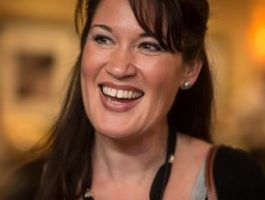
Relational Identity
How do you help your kids form healthy, nurturing relationships? John Majors, a husband and father of three, and Michelle Hill, a mentor of young women, offer help to parents for discussing friendships, mentors, and opposite sex relationships with their teens through FamilyLife's new resource, Passport2Indentity™. Similar in format to FamilyLife's resource for tweens, Passport2Purity®, John and Michelle talk about the benefits of getting away with your teen to have meaningful discussions about life issues.
Show Notes
About the Host
About the Guest
-
How do you help your kids form healthy, nurturing relationships? John Majors, a husband and father of three, and Michelle Hill, a mentor of young women, offer help to parents for discussing friendships, mentors, and opposite sex relationships with their teens through FamilyLife's new resource, Passport2Indentity™. Similar in format to FamilyLife's resource for tweens, Passport2Purity®, John and Michelle talk about the benefits of getting away with your teen to have meaningful discussions about life issues.
-
Dave and Ann Wilson
Dave and Ann Wilson are hosts of FamilyLife Today®, FamilyLife’s nationally-syndicated radio program. Dave and Ann have been married for more than 38 years and have spent the last 33 teaching and mentoring couples and parents across the country. They have been featured speakers at FamilyLife’s Weekend to Remember® marriage getaway since 1993 and have also hosted their own marriage conferences across the country. Cofounders of Kensington Church—a national, multicampus church that hosts more than 14,000 visitors every weekend—the Wilsons are the creative force behind DVD teaching series Rock Your Marriage and The Survival Guide To Parenting, as well as authors of the recently released book Vertical Marriage (Zondervan, 2019). Dave is a graduate of the International School of Theology, where he received a Master of Divinity degree. A Ball State University Hall of Fame quarterback, Dave served the Detroit Lions as chaplain for 33 years. Ann attended the University of Kentucky. She has been active alongside Dave in ministry as a speaker, writer, small-group leader, and mentor to countless wives of professional athletes. The Wilsons live in the Detroit area. They have three grown sons, CJ, Austin, and Cody, three daughters-in-law, and a growing number of grandchildren.
-

John Majors
John and his wife Julie met in college while both active as students with Campus Crusade for Christ (now Cru). After graduation, they married and started serving full time in college ministry. During their time on campus, they noticed how much of what shapes a college student comes directly from their parents: the good, bad, and even the ugly. Seeing this caused their burden to serve in family ministry to grow, eventually leading to them serving with FamilyLife. It was in this season where th...more
Michelle Hill
Radio has been ingrained in Michelle for most of her life. This love for radio has taken her to various radio stations and ministries in places like Chicago, Alaska and other snow covered terrains like her hometown in north central Iowa. In 2005 she landed on staff with Cru/FamilyLife®. While at FamilyLife she has overseen the expansion of FamilyLife Today® internationally, assisted with the creation of Passport2Identity™-Womanhood and is now the host of FamilyLife This Week®...more
John Majors and Michelle Hill help parents discuss friendships, mentors, and opposite sex relationships with their teens through FamilyLife’s new resource, Passport2Indentity™.
Bob: There is a pattern that seems to be somewhat regular for teenage girls as they think about teenage boys.
[Excerpt from Passport2Identity]
Young Woman: Step 1: Spot a cute boy. We’ll call him, Boy “A.” Step 2: Dream about Boy “A.” Step 3: Do whatever it takes to make Boy “A” notice me. Step 4: Even though Boy “A” doesn’t pursue me, hang on to my dream about Boy “A.” Step 5: Mend my broken heart after hating Boy “A” and finding another cute boy—Boy “B.” Replace Boy “A” with Boy “B.” Dream about Boy “B.” Make sure Boy “B” notices me. Hang onto my dream of Boy “B” until he—move onto another boy—Boy “C.”
Dennis: Does that really happen with girls, Michelle? Michelle Hill—
Michelle: No, not at all!
Dennis: —joins us, here on FamilyLife Today. John Majors is back. You say it does?
Michelle: Yes, it does—it does all the time. I can guarantee—probably, at least, 85 percent of the girls out there—that is the story—
Bob: Let me just say—
Michelle: —going on in their head.
1:00
Bob: Let me say—welcome to FamilyLife Today. Thanks for joining us on the Thursday edition. All this week, we’ve been talking about 15- and 16-year-olds. We’ve been talking about the challenges that they face and the identity issues they’re wrestling with—and how moms and dads can be their allies, and can be used by God to help those 14- and 15- and 16-year-old mid-teen sons and daughters really get anchored rightly and have a solid understanding of who God made them to be.
Dennis: We’re talking about issues of identity—helping your teenage young lady / young man know who he is, know his sexual identity, his relational identity as he relates to peers and the opposite sex, understand who he is as he is tempted to, maybe, go with some of the more popular concepts around fluid gender identity today, Bob, and know where he stands on issues like homosexuality / same-sex marriage.
2:00
You know, we’ve got to train our young people to know what to believe and what the Bible teaches about these matters.
John Majors and Michelle Hill, I mentioned earlier, have joined us here. They have created a new resource for parents of young women and young men, between the ages of 14 and 16, that really enables a mom to get away with a daughter and a father to get away with a son and have some relevant conversations around these issues of identity.
Explain to us, really, what you were trying to accomplish, John, as you take on this issue—what Bob was talking about—about relationships and rightly experiencing community but not being dependent on the peers to find out who you are.
John: One of the quotes I ran across—when we were researching for this—was a guy who said: “You are the average of the five people you spend the most time with.
3:00
“So, surround yourself with people who are doing interesting things, who are thinking interesting thoughts, who challenge you to be better.”
That’s why we really try to give them a category. There are three main types of relationships that we focused on. One is the mentors: “Who are the mentors in your life who are helping speak truth down into your life?” The other is a band of brothers—so, “When you think about your peers, who are the men or women you surround yourself with that help you grow stronger and grow closer to Christ?”
Bob: Mentors, peers, and then—what’s the third group?
John: The opposite sex.
Bob: Oh, and your relationships with members of the opposite sex—
John: Yes, that’s right.
Bob: —because that’s going to shape how you understand and how you look at your identity as well.
John: Absolutely.
Michelle: Yes.
Dennis: And a healthy relationship with the opposite sex is really important—that doesn’t mean it needs to be romantic.
John: Correct.
Michelle: Right.
John: But what we try to navigate in here is: “How do you think about the opposite sex rightly in this stage of life?”
Dennis: Such as? What do you mean?
John: The theme verse we draw on here is Romans 12:9-10: “Let love be genuine.
4:00
“Abhor what is evil. Hold fast to what is good.” We really wanted to emphasize the idea of genuine love: “How do you genuinely love the people of the opposite sex in your life? Are you treating them the way you would want someone to treat your sister or your daughter?”—really emphasizing the idea of genuine love.
Bob: And once again, you took that verse and we went to our friends at Seeds Family Worship. They did all of the music for Passport2Identity—just as they did for Passport2Purity®.
John: That’s right.
Bob: So, Romans 12:9-10 is put to music, and it sounds—here’s what it sounds like.
[Genuine]
5:00
And the thing about having a verse like that put to music is that, as you’re listening to these CDs—a father and a son or a mother and a daughter—as a part of a Passport2Identity getaway, where the two of you are off on your own and going through the workbook and listening to the CDs—when you get a verse like that put to music, it just gets—it’s still stuck in my head.
Dennis: It’s sticky.
Bob: [Singing] “Let love be genuine.” I mean you can hear it—it just comes back to you.
Dennis: And it contrasts biblical love with how the world loves. There is a lot of selfishness in how the world is training young people to love one another. I think of the whole hooking-up culture.
6:00
Parents have got to prepare their daughters and their sons how to think about this culture that says, “Hey, just go satisfy yourself at the expense of the opposite sex,” and “How do you handle the advances of a boy who is being too aggressive or a girl who is being too aggressive?”
Bob: One of the ways you guys get into this subject on the CDs is by having a little fun—setting up some humorous, tongue-in-cheek situations like—you had a group of people getting together at a meeting / what you called Autonomous Anonymous, where they’re recognizing that no man is an island and “We really do need one another.” This is what it wound up sounding like.
[Excerpt from Passport2Identity]
Leader: Alright. Good evening. Welcome to Autonomous Anonymous—a meeting for those who have gone solo and want to talk about it. So, let’s get started; shall we?
Steve: Hi. My name is Steve.
Group: Hi, Steve.
7:00
Steve: I used to be one of the stooges. You know The Three Stooges—Larry, Moe, and Curly—there used to be four. I went off on my own, and I was the one stooge. I thought I could be funnier all by myself; but it turns out that a 2 x 4 to the head, when there’s no one else around, isn’t funny—it’s painful. [Whack] Ow! [Laughter turns to crying] It really hurts!
Leader: Thank you for sharing that. You can know that we’re all laughing at you. Alright; who’s next?
Mentos: You might know my friends, The Three Musketeers, Aramis, Athos, and Porthos. Hi, my name is Mentos.
Group: Hi, Mentos.
Mentos: Sure they got a candy bar named after them; I get breath mints—whatever. Anyway, I’m the one musketeer.
8:00
I live by one motto and one motto only: “All for one and all for one.”
Van Gogh Picasso: My name is Van Gogh Picasso. I’m a ninja turtle—whatever.
Group: Hi, Van Gogh Picasso.
Van Gogh Picasso: Yes; so, I left the other four. I mean, I can fight crime on my own—whatever. Sure, I mean, I see them high-fiving each other after they beat up on the bad guys—whatever. You know what I mean? I can high-five myself! Cowabunga! See, I’m fine on my own.
[Studio]
Bob: So, Autonomous Anonymous—the point there, Michelle, is that to isolate yourself—and some teenagers will do this / they’ll just push off and kind of get isolated. That’s just not how we were designed to live.
Michelle: We weren’t. We were designed to be in fellowship with God, and then, with others. As we talk about in Session 4, we need mentors; we need friendships; we need those good close friendships that keep us accountable.
9:00
The parents who are listening—your children need these relationships. They need these people to follow, to be an example, to point them back to God.
And parents need help. We’re not an island. If we’re talking about the kids—if we’re talking about the teens that need help and need friendships—parents also need that extra person who is also speaking into their child’s life.
John: So, we’re really pushing a young person hearing this to be proactive in finding a mentor. It’s great if a mentor comes after you; but also, go out and find people. One of my theories has always been: “Get around guys you want to be like.” That’s why I came to work here—that’s why I came to work for you, Dennis, because there are things in you I saw that I want to learn from you. There are things about you, as a man, I want to be like. So, we’re pushing guys to be proactive: “Find mentors / get around guys you want to be like.”
Dennis: And there are a lot of parents, listening to us right now talk, and they’re saying: “You don’t know my daughter or my son. They’re nowhere near in the ballgame here.
10:00
“You couldn’t challenge them to find a mentor because who they are hanging with right now is really a bad influence.”
You know, 1 Corinthians 15:33 is one that we talked about in Passport2Purity—mom and daughter / father and son—“Bad company corrupts good morals.” So, what do you do when you see your son or your daughter hanging with the wrong group? Parents have to take charge here.
John: We had a group of guys, where their fathers got together and saw this happening. They said, “You know, our boys are spending time together; but they are not really being intentional with that time.” They took it on themselves and said, “Let’s gather them together and let’s take them through…”—they took them through Stepping Up®, the video series, Dennis, based on the book you wrote about how to grow into manhood. They said, “We want to be intentional to help you guys grow closer together but to help you grow closer to Christ in the midst of that.” They challenged them: “How can you keep growing together on your own, even without us having to be here?”
11:00
That led to them forming a group they called The Roof Crashers.
Bob: And you interviewed them—
John: That’s right.
Bob: —for this and include their story in Passport2Identity. Let’s listen to these guys describe how their relationships with one another were really making a difference in their lives.
[Excerpt from Passport2Identity]
Young Man: There’s such a difference from just being friends, and hanging out, and having a good time to actually challenging each other and calling each other up.
Young Man-1: “As iron sharpens iron, so, one man sharpens another.” And part of iron sharpening iron—sparks will fly.
Young Man-2: It’s hard to open up. It’s hard to say, “This is how I’m messing up this week. This is how I am not loving God.” But once you do, it’s like, literally, like lifting a weight off your back.
Young Man-3: After every meeting, I felt like, “I’m going to go out there, and I’m going to keep giving it my best and receiving grace.”
12:00
Young Man-4: No; I could say something. Do you want to say something, Michael?
Michael: You can go ahead.
Young Man-4: Okay. What I grew to appreciate a lot about The Roof Crashers was—yes, we had a lot of similarities. We could get together out in the woods and just have a blast! But there were differences among us—whether it was something I was going through—and when I’d share it with the group, they’d be able to give me some insight, that hadn’t even crossed my mind, on how I could be better at constructing my schedule or something so that I wasn’t continually putting God by the wayside and getting distracted with homework, or school, or whatever.
But also, sometimes, when they’d be talking about what’s going on in their life, they’d say something that hadn’t even occurred to me. Someone would mention how they’ve just been challenged to start to memorize Scripture. I’d think: “Wow! I haven’t given any thought to memorizing Scripture in a long time.” And we could say, “Okay, do we want to try to memorize something this week as a group?” And I remember, one time, we did some passages in Romans—just about overcoming evil—and that was a big encouragement to me.
13:00
[Studio]
Dennis: These guys that we just heard were teenagers. They formed their own group called The Roof Crashers. Explain why they called themselves that.
John: Well, it was based on a story in Mark, Chapter 2, where a couple of guys took their paralytic friend up onto the roof of a house so he could see Jesus. They tore the roof open and lowered him down to Him. They were that committed to their friendship that they would do whatever it took to get him in front of Jesus so that Jesus could heal him. It was that kind of friendship that they wanted to bond in their group together.
Bob: As parents, we need to be doing all we can to nurture, and facilitate, and put kindling around, and fertilizer around those kinds of friendships when we see them happening. Then, we also need to be working hard to disrupt the negative relationships when we see those happening. It’s not easy to do because you send your son or daughter off to school—and you don’t know what’s going on, or who they are hanging with, or what’s happening there—but there is real power for good or for evil in these relationships.
14:00
Dennis: Barbara and I intercepted more than one relationship that we felt like might be borderline unhealthy with our sons or our daughters on more than one occasion. I mean, we had six kids. You’re not going to be able to control all their friendships they have at school; but you’ve got to monitor what’s going on and who they are hanging out with. And if they are hanging with the wrong people, you need to make it next to impossible to get with them. Be shrewd / be smart and not make it a negative, but make it difficult for them to get together.
John: I think it’s good, Dennis, to just encourage the parent: “You are the parent. You do have the right to make some of those tough calls and step in. Your kids need that because they don’t have the wisdom to see that.”
Dennis: Be courageous!
John: Yes.
Dennis: And sometimes, parenting does demand that we step up and be courageous in our kids’ lives.
Bob: And part of what you guys talk about in Session 4, with young men and young women, is their relationships with members of the opposite sex.
15:00
It’s on their minds, and we want those relationships to look appropriate and healthy. So, that is addressed in this session. But you also have to deal with what young men and young women are questioning today; and that is, “If I’m attracted to somebody of the same sex, what does that say about my identity?” We used a fictionalized story here to illustrate what a lot of young people are facing today.
[Excerpt from Passport2Identity]
Young Woman: Dear Journal, what a day! Lots happened! Let’s see—I dropped a cup of coffee at work in someone’s lap, had a big misunderstanding with Mom / lost some more privileges, fought with Ashley—she pretty much hates me now. Nothing is going right today!
16:00
And before that, Mr. Schmidt, my biology teacher, said something in class that we are free to choose who we like—as in girls can like girls. He said it was natural. Then, Ella was talking about how her sister came out. I thought it was kind of weird, but then, like everyone got excited like it was really cool or whatever. I don’t know what to think. I’ve heard that some girls at school are experimenting with each other—like practically everyone thinks it is okay; but is it? I don’t know what to think. #Confused; #LongDay; #RealLife.
17:00
[Studio]
Bob: Yes, no doubt that is real life. That’s an excerpt from Session 4 of Passport2Identity. And from that point, we’re able to guide a young person and a parent into exploring” “What does the Bible teach about our relationships—or same-sex relationships?” and “Why are there sexual boundaries around those relationships?”
It really does tee this up in what I think is a very appropriate way for a conversation to ensue because there may be sons and daughters who are experiencing same-sex attraction. We want them to be able to talk to their mom or their dad about that without shaming it; and yet, at the same time, we want to say, “Here’s how the Bible guides us, and here’s the direction it points us.”
Michelle: We talked about just gender identity—and what it is to be a woman, and what it is to be a man, and how there is so much confusion out there—and now, there is confusion about who we should be attracted to. And teens, these days, need a safe place to talk through this—
18:00
—not with their peers who are telling them, “It is okay,” but they need a safe place to be talking about this. Who better than their parent?—to say / help them unpack what the Bible says about it, and then, unpack their emotions and what they are thinking.
Dennis: So, you, actually, in the travel journal for the young lady, would encourage a conversation with her mom about what she’s struggling with: “Is this a problem for her?”— right?
Michelle: Right.
Dennis: So, for a lot of parents, they are feeling like this is not safe, but honestly—
Michelle: It’s a scary place to go!
Dennis: It is. It really is, but this is what must happen. There needs to be these kinds of discussions that let the pressure off of the issue and bring it out of the dark and into the light.
John: They are going to hear about / they are talking about it—it’s all around them. So, the question is: “Are you going to engage on it from a biblical perspective?” And we hope to provide that. We’ve got a couple of different stories—one from a woman who struggled with that / and then, one from a man who has struggled from same-sex attraction—
19:00
—but who now view it from a biblical perspective. So, we present that in the audio. That tees you up to talk about it in a way that, hopefully, will be helpful for a young person to give them an island of truth.
Dennis: You’re really right, John. And some parents, who are listening to us right now, are thinking: “I need to determine what I believe. This is uncovering a weakness in my own understanding of Scripture.”
But a second thing—and I just want parents to think this through: “As you raise kids through adolescence, you are going to face some challenging moments, where you cannot allow your face to express the terror, the questions, the doubt, the shame, the absolute, maybe, anger at points of what your kids may share or where they may fail. What you’ve got to do is—you have to say, “I’ve got to be a shock-absorber for my daughter / for my son as they go through these perilous years, and hear their failures, and listen to them and their doubts, and shoulder their temptations with them so it really is a safe place.’”
20:00
It’s dangerous enough in the culture for them to be out there; but to be out there alone—without their mom and dad knowing what’s going on, and being engaged, and connecting with them—that’s the biggest danger of all.
Bob: And to the parent, who would say, “I wouldn’t know what to do if my son or my daughter told me that they were experiencing same-sex attraction,” I’d just say back, “It’s much better to have that out in the open and you not know what to do than it is for your son or your daughter to just be keeping it a secret.” And you say, “Because I wouldn’t know what to do, I don’t want to hear it.”
Dennis: Yes; but it’d be okay, at that point, to say: “You know, I just want you to know how proud I am of you feeling secure enough to express that. I’d like to continue talking about that, going forward.” It doesn’t mean you have to have the answer right now, but you can go listen to some other FamilyLife Today broadcasts that will help you and equip you to be able to have these discussions.
Bob: Yes; in fact, we’re going to put a link up on our website to some of those programs that you might want to listen to.
21:00
I was having a conversation just recently with a mom and a dad, who are going through this very thing with their teenage son, who is same-sex attracted. They are looking for help and for answers. And we were able to provide them with some programs and some resources that they said were very helpful.
So, again, you’ll find that when you go to FamilyLifeToday.com, which is also where you’ll find information about Passport2Identity for young men and for young women. We hope that you’ll block out a couple of days, later this spring or this summer, when you and your son or you and your daughter can get away and have one of these Passport2Identity getaways. Do something fun together and listen to this content as you drive there and as you drive home. Go to FamilyLifeToday.com for more information or to order the resource online; or call us, toll-free, at 1-800-358-6329.
22:00
That’s 1-800-“F” as in family, “L” as in life, and then the word, “TODAY.”
I should mention here—if you have a preteen / somebody who is 9, 10, or 11—plan the same kind of getaway with them / only, take them on a Passport2Purity getaway. And you’ll find information about Passport2Purity on our website as well. So, again, go to FamilyLifeToday.com or call 1-800-358-6329. That’s 1-800-“F” as in family, “L” as in life, and then the word, “TODAY.”
By the way, if you haven’t downloaded the new FamilyLife app, check out your app store. Make sure you type in “FamilyLife” as one word. When you do that, the first thing that will show up in the app store is our new app. It’s free, and it gives you access to FamilyLife content on the go. So, check it out in your app store; or go to FamilyLifeToday.com if you need more information on how to get the new FamilyLife app.
We want to say, “Congratulations!” today to Pastors Clark and Dana Williams, who live in Mountain Home, Idaho.
23:00
The Williams are celebrating 32 years of marriage today. They are regular FamilyLife Today listeners. They listen on KBXL in Boise. They’ve been to the Weekend to Remember® nine times, and they are Legacy Partners—they help support this ministry. So, “Congratulations!” to the Williams; and “Thank you for your ongoing support of FamilyLife Today.”
If it weren’t for folks, like Clark and Dana—who help make this radio program possible as they support this ministry / and we appreciate that financial support—we couldn’t do what we do if it weren’t for folks like you. In fact, today, if you can help with a donation of any kind, we’d like to say, “Thank you,” by sending you Barbara Rainey’s brand-new book, which is called Letters to My Daughters: The Art of Being a Wife. Go to FamilyLifeToday.com, make a donation online; or call 1-800-FL-TODAY to donate and ask for a copy of the book; or request the book when you donate in writing. Our mailing address is FamilyLife Today, PO Box 7111, Little Rock, AR; and our zip code is 72223.
24:00
Now, tomorrow, we want to talk about the mission / the assignment that God has for your son or for your daughter. One of our assignments, as parents, is to help our sons and daughters figure out what that assignment is, and then, get them launched / pointed in the right direction. We’ll talk about how you do that tomorrow. Hope you can tune in for that.
I want to thank our engineer today, Keith Lynch, along with our entire broadcast production team. On behalf of our host, Dennis Rainey, I’m Bob Lepine. We will see you tomorrow for another edition of FamilyLife Today.
FamilyLife Today is a production of FamilyLife of Little Rock, Arkansas. Help for today. Hope for tomorrow.
Song: Genuine
Artist/Album: Seeds Family Worship for Passport2Identity™
We are so happy to provide these transcripts to you. However, there is a cost to produce them for our website. If you’ve benefited from the broadcast transcripts, would you consider donating today to help defray the costs?
Copyright © 2016 FamilyLife. All rights reserved.
1





